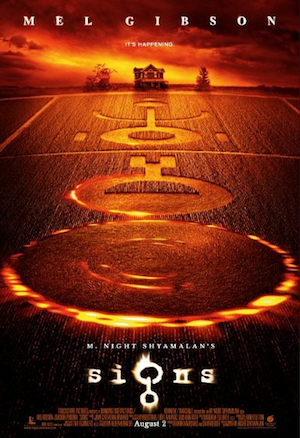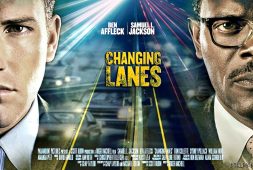
Main Point of Discussion: God is our comfort in times of crisis.
The Movie Clip: Miracle or luck?
Tragedy yanks us out of our comfort zone and leaves us with nothing to grasp but our faith and hopes. If we have no faith and don't truly hope . . . then tragedy leaves us empty. The movie Signs
raises excellent questions about what we cling to when tragedy strikes. This thought-provoking film, starring Mel Gibson and Joaquin Phoenix, may look like just another movie about visitors from outer space, but it's much deeper than that. This is an excellent film (although a little too intense for many younger audiences). It has the jumps and thrills of some of Hitchcock's best films along with a well written script, incredible performances, and comic relief throughout. This was one of the better films of 2002.
This particular scene from the film provides a great discussion starter about the existence of God and who we turn to in a time of crisis.
Introducing the Clip:
The film follows a small farming family in Bucks County Pennsylvania that wakes up to find 500 foot crop circles in their backyard. Soon crop circles are appearing all over the world along with sightings of extra-terrestrial beings. Eventually the news shows 14 lights in the sky- most likely UFO's. The question arises, “Is this the end of the world?”
The Hess family, having recently lost their mother in an auto accident, is once again faced with fear and who to turn to during these times of tragedy. Ever since the loss of his wife, Graham (Mel Gibson) doubts whether there is a God at all. Regardless, his family continues to look to him for comfort or a glimpse of hope in this dire situation.
Scene Script:
BEGIN CLIP AT 39 minutes and 30 seconds (beginning of Chapter 10: The scene starts with the TV newscast. Then the Hess kids briefly discuss what tape to use to record the news.)
- (KEY DIALOGUE)
Newscaster: (voice on TV) You are seeing a live feed from our affiliate down in Mexico City. What you're seeing is real. It's unbelievable. Everything they wrote in science books is about to change!
(After an evening of silence in front of the TV, Merrill (Joaquin Phoenix) finally turns to his brother Graham (Mel Gibson) and asks a question.)
Merrill: Some people are probably thinking this is the end of the world.
Graham: That's true.
Merrill: Do you think it could be?
Graham: Yes.
Merrill: (pausing, and thinking about what he just said) How can you say that?
Graham: That's not the answer you wanted?
Merrill: Can you pretend to be like you used to be? Give me some comfort.
Graham: People break down into two groups. When they experience something lucky, group number one sees it as more than luck, more than coincidence. They see it as a sign … evidence that there is someone up there watching out for them.
Group number two sees it just as pure lucky—happy turn of chance. I'm sure that the people in group number two are looking at those 14 lights in a very suspicious way. For them, this situation is a 50/50. It could be bad. It could be good. But deep down they feel that whatever happens, they're on their own. That fills them with fear. Yeah. There are those people.
But there's a whole lot of people in group number one and they see those 14 lights and they're looking at a miracle. And deep down they feel that whatever's going to happen, there will be someone there to help them. And that fills them with hope. And what you have to ask yourself is what kind of person are you? Are you the kind that see's signs or sees miracles? Or do you believe people just get lucky? Or look at the question this way, is it possible that there are no coincidences?
END CLIP AT 43 minutes and 40 seconds (This is a good place to stop the scene on a serious note. If you kept the film rolling, the next bit of dialogue by Merrill is comic relief. He tells a funny story and concludes, ” …I'm a miracle man!”).
Transitional Statement:
In this clip, the Hess Family has obviously been through a lot. Now they fear a possible end to life as they know it. During this time of tragedy and fear, they are desperate for hope. Mel Gibson’s character, Graham, tells it the way he sees it. He gives two options: an option of hope—that God might be here for us during tough times, and an option of despair—we’re alone in our tragedy.
As you watched this clip, it might have caused you to question which of these groups you float toward. When tragedy strikes, do you have any hope? Or do you feel alone? It’s something to think about.
Divide into Small Groups:
Let’s go ahead and split up into our discussion groups, and then afterward we’ll come back together for a final word.
CLICK HERE for a quick training article on how to maximize your small groups using our small group format—a great resource to equip your small group leaders.
Discussion Questions::
- AROUND THE CIRCLE: Before we get started, let’s go around the circle and share our name and our favorite scary movie.
- ASK A FEW: If some enormous tragedy were to strike, who would you want to be with? Why?
- ASK A FEW: This family had just come out of one tragedy (loss of their mother) and now faces another huge tragedy—a threat that could end life as they know it. Share a time that you or your family faced a tragedy or feared something big like this? (Maybe on 9/11, or maybe as our world crept toward war.)
- ASK A FEW: Share how you reacted to this tragedy or fear of tragedy?
- ASK A FEW: When tragedy strikes, we often ask deep questions about life or about God. Why is that?
- ASK A FEW: Mel Gibson's character, Graham, said that there was two types of people. Group #1 believes someone is up there watching out for them. Group #2 believes they're alone. Do you know people in each of these groups? Which group do you think handles tragedy better?
- AROUND THE CIRCLE: If war broke out—not across the world—but in your country, in your city, in your neighborhood, and there was chaos all around us, which of these “groups” (the “belief” group, or the “alone” group) would you rather be in and why?
- ASK SOMEONE: According to that verse, what is this person’s comfort amidst suffering? (leader—the answer you are looking for: God’s promise preserves my life.)
- ASK A FEW: Why do you think the author is comforted by God’s promises?
- ASK SOMEONE: According to verse 3 above, what does the author label God “the Father of”… and “the God of?” (leader—the answer you are looking for: the Father of compassion and the God of all comfort.)
- ASK A FEW: In verse 4 above, how can we pass on the comfort we’ve received? What might this look like—give an example?
- ASK A FEW: Verse 5 above refers to Christ’s sufferings. What did Christ suffer? (leader—the answer you are looking for: the cross. He was rejected, abandoned, mocked, whipped, nailed to a cross, and left to die.)
- ASK A FEW: So, can Christ relate to our suffering? Does our suffering even compare to His?
- ASK A FEW: How can we be comforted knowing there is a God up there that understands us and cares for us?
- AROUND THE CIRCLE: What is something you can take comfort in when tragedy strikes? How can you react differently than someone with no hope?
Read the following passage written as a prayer to God:
- Psalm 119:49-50 (NIV)
Remember your word to your servant,
for you have given me hope.
[50] My comfort in my suffering is this:
Your promise preserves my life.
Read another passage:
- 2 Cor. 1:3-5 (NIV)
[3] Praise be to the God and Father of our Lord Jesus Christ, the Father of compassion and the God of all comfort, [4] who comforts us in all our troubles, so that we can comfort those in any trouble with the comfort we ourselves have received from God. [5] For just as the sufferings of Christ flow over into our lives, so also through Christ our comfort overflows.
For deeper examination of the verses: take one verse at a time and ask kids to put the verse in their own words.
Wrap Up:
God is the God of comfort. He not only seeks a relationship with us, He gives us hope and comfort during trying times. When crisis strikes, God will be there for us. We don't have to wonder if there is “someone there to help us.”
2 Corinthians 2:6 refers to Jesus Christ as our “comfort” and our “salvation.” Not only is Jesus our comfort, but He's the one who wants to save us. Now that's comforting!
(You may give a Gospel presentation at this point if the time is right. For a sample of how to give a Gospel presentation see our “I Need to Know How to” web page.)
Close in Prayer
Jonathan McKee
Jonathan McKee is the author of over twenty books including the brand new The Guy's Guide to FOUR BATTLES Every Young Man Must Face; The Teen’s Guide to Social Media & Mobile Devices; If I Had a Parenting Do Over; and the Amazon Best Seller - The Guy's Guide to God, Girls and the Phone in Your Pocket. He speaks to parents and leaders worldwide, all while providing free resources for youth workers on TheSource4YM.com. Jonathan, his wife Lori, and their three kids live in California.



